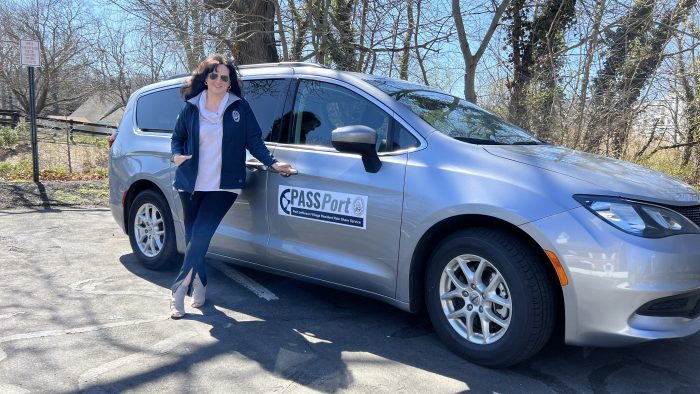Seven-term incumbent Port Jefferson Mayor Margot Garant is leaving the village government, instead making a run for Town of Brookhaven supervisor under the Democratic ticket.
In a contest to fill Garant’s seat, Deputy Mayor Kathianne Snaden is running against trustee Lauren Sheprow, who is now a write-in candidate. In an exclusive interview, Snaden opened up about her plans for economic development, East Beach, recreation, parking and more.
What would be your top priority for the coming term, if elected?
Using my institutional knowledge and experience in every aspect of the village.
One of the things I had just started working on and want to take to the next level when I become mayor is economic development. Over the last year or so, Kevin Wood — our parking and mobility [administrator] — has been in charge of economic development.
I’d like to start a task force to bring together business and restaurant owners, the chamber of commerce and the Business Improvement District. I want to reach out to developers and real estate brokers and have a committee or task force that will be able to connect with other businesses — national businesses, restaurants and retail establishments — to see what they need to come into our village to continue to make our downtown a thriving district.
Doing that task force will be beneficial to take our village to the next level, where it needs to go. We’re very lucky to have a vibrant downtown, and we must keep that going. It benefits the residents and the entire village as a whole.
If elected, how do you intend to help guide East Beach bluff stabilization efforts and maximize the use of the village-owned Port Jefferson Country Club?
Fortunately, we have a map forward with that.
We’ve been working with our coastal engineers, and the Board of Trustees voted unanimously on their plan, which includes finalizing the bluff stabilization with the FEMA grant — the $3.75 million.
Once the bluff is stabilized, we will move to the redevelopment of the property at the top of the bluff. Our coastal engineers, the experts in this field, were able to give us a plan for pickleball and tennis courts, which is key to bringing back that membership.
We were very sad to lose that membership when we had to shut the courts down for reconstruction, but I’m hoping this new racket sports complex will bring back that membership.
The best part about that is all of that project will be self-sustaining, paid for by the membership. This will not be on the backs of the taxpayers, which is very important to me. I support that whole plan.
What is the role of the village board in overseeing new developments and redevelopment projects?
Working very closely with our planning and building departments and our Zoning Board of Appeals if that’s one of the routes a developer takes. Careful and responsible development, always looking at traffic studies and environmental impacts. Always talking to the surrounding residents and the residents as a whole.
Keep in mind that development will help to increase our tax base. At this point, with the LIPA glide path continuing and going into its final stages, we must be very mindful of our tax base, making sure that it’s solid.
How can the village alleviate its parking capacity challenges, balancing the competing interests of residents, businesses and tourists?
As we know, parking is a big issue in Port Jefferson because we’re not getting any more property.
One of the things I did when I started as parking liaison was work with our Parking Department head to build our Barnum parking lot. That was key.
When I found out that we have about 640 spaces in the village and over 300 were used by employees, I said, “We have to do something.” Employees need to park, but that’s a large portion of our parking capacity.
For an employee — let’s say a waitress, for example — that doesn’t make a huge salary, it would be a huge hit to pay for parking every shift they have. But if we incentivized them to park in the Barnum lot free of charge, I felt that that would be very helpful. That parking lot has 43 spaces, I believe, and it has been very successful.
I continue to work with the Business Improvement District and the chamber of commerce, adapting to their changing needs. As times changed — and during COVID, the needs changed — we were able to pivot on the fly, changing the parking for the needs of the businesses.
One of the other things I’ve done and continue to work on is the PASSPort rideshare service. The idea behind PASSPort was that even though we do have resident parking, it’s limited. To alleviate residents’ parking in the other spaces that visitors can park in, they can take the PASSPort rideshare service.
One of the other things I started about four years ago was working with an engineer and our head of parking for a potential parking structure. That’s been in the works for a few years. Initially, there was an issue with the location and cost of the structure, as well as whether it would yield enough spaces to pay for itself.
One of the things I pride myself on is never saying “no.” There’s always a path to solve a problem. When I hear, “We can’t,” I say, “How can we?” And I gather the best minds in the room to figure out the best path forward that benefits the entire community.
What is your preferred method for public engagement?
That’s the reason I ran for trustee in the first place — I ran to be the voice of residents of the village of Port Jefferson.
I enjoy speaking to people, hearing their concerns. Having the ability as deputy mayor to take their problems to Village Hall and get that problem addressed immediately has always been very important to me.
When I see the back-and-forth on a platform like Facebook, being able to answer resident questions in real time with factual information has always been something I’m happy to do. I would continue to always be available to people on social media.
Another thing I brought to the village and would continue to expand on is technology changes. We started live-streaming board meetings during COVID, and I was a strong advocate for continuing that once COVID ended.
The other thing I started was our [Port] eReport, our newsletter. I got people on board to help write the newsletter and gather the information. It expanded and expanded, and it is what it is today because of that initiative.
I’m a “my door is always open” kind of person. I’ve always been very proud of my openness and ability to communicate with folks on many levels.
What is your professional background, and how does it apply to the role of a village mayor?
I worked as a paralegal for almost 20 years in the Buffalo area of upstate New York and on Long Island.
In litigation, I worked on the insurance defense side for Ford and Hyundai motor companies. I did insurance defense cases for them and did a lot of work as a family law paralegal for attorneys here on Long Island.
I have been deputy mayor for the last two years and trustee for four years. I have been commissioner of building and planning, commissioner of public safety, liaison to parking and mobility, the Zoning Board of Appeals, the planning department, beautification, the Business Improvement District and have worked closely with the chamber of commerce.
My vast experience in the village and my institutional knowledge of all of the workings of the village have all come into play to get me where I am today.







